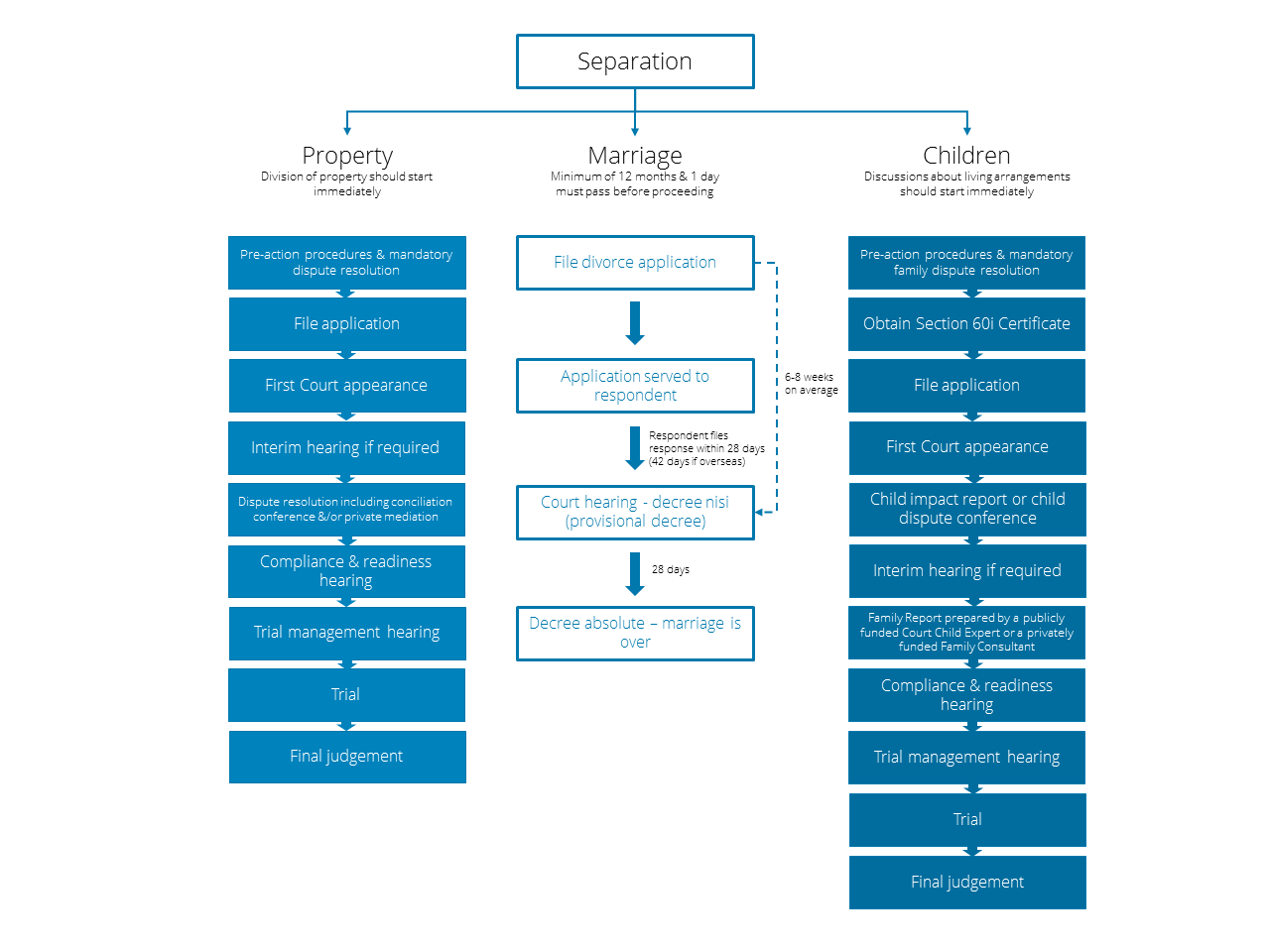In this guide you’ll find answers to your questions about divorce in Australia, from the overall process, to how to file for divorce, to who gets what.
Our family law specialists are on top of all the latest developments in divorce law and this page is kept up to date with any changes as they occur.
If you still have questions about your individual situation you can call us on 1800 084 923 or book a free initial phone consultation >
1. Overview of the divorce process
The sole grounds for getting a divorce in Australia is the irretrievable breakdown of marriage, established if the Federal Circuit and Family Court of Australia (the Court) is satisfied parties to a marriage have separated and have lived separately and apart for a continuous period of 12 months. At the date of separation there must be an intention on the part of at least one of the parties that the separation is meant to be final.
A Divorce Application can be applied for by one party (sole application) or together with the other spouse (joint application).
The Family Law Act 1975 (the Act) provides that parties have 12 months from the date of a final divorce order within which to file an application in Court for a property settlement or spouse maintenance.
The flow chart below gives an overview of the divorce process in Australia:

Got questions about this? Call us on 1800 084 923 or book a free initial phone consultation >
2. Separation
As mentioned above, you and your partner must be separated for 12 months in order to file for divorce and there must be an intention on the part of at least one of you that the separation is meant to be final.
However it is possible to be separated while living under the same roof with your former spouse. If this applies to you, the Court will require further evidence and court documents to be filed in order to prove that you and your former spouse have been separated for at least 12 months, including but not limited to:
- Your living arrangements in the house; and
- Separation of your finances.
Got questions about this? Call us on 1800 084 923 or book a free initial phone consultation >
3. Who Gets What?
When determining a property settlement, the court may make such orders as it considers appropriate to change the interests of the parties in property. The orders made by the court must be in all the circumstances “just and equitable”. The following process is applied when determining what orders to make for the division of property:
Step 1: Identify and value the assets, liabilities and financial resources.
Step 2: Look at the contributions made by each party including financial and non financial contributions during the relationship. These include: financial contributions towards property, inheritances received throughout the relationship, parenting and home making contributions.
Step 3: whether an adjustment should be made because one of the parties has greater future needs than the other. There is a long list of factors for the Court to consider and they include but are not limited to the following:
- whether one of you has the care of the children;
- your respective incomes;
- the future employment prospects and earning capacities of each of you;
- your respective superannuation entitlements;
- the age and health of each of you; and
- the assets and financial resources of each of you.
Step 4: Is it just and equitable to make a property settlement order in all of the circumstances?
Got questions about this? Call us on 1800 084 923 or book a free initial phone consultation >
4. Children & Custody
Family Dispute Resolution
Parties to a parenting dispute are required to attend compulsory mediation with a Family Dispute Resolution practitioner to try and resolve their parenting dispute before making a parenting application to the Court. A section 60I certificate will be issued following the family dispute resolution process, which a party may then use to support their parenting application to the Court. There are several exemptions that may apply in certain circumstances and when it is unsafe to attend the family dispute resolution process.
There are various methods of dispute resolution including but not limited to:
- Mediations;
- Round table discussions;
- Collaborative process; and
- Arbitration
The lawyers at Tiyce & Lawyers are highly experienced in resolving our client’s parenting disputes through various dispute resolution methods. Our focus is on empowering our client to make child focused decisions that are in the child/ren’s best interests.
Parenting Plan
A Parenting Plan is a document that sets out how the parties will deal with the children following the parties’ separation including:
- Who will have parental responsibility for the children and decision making for the children’s needs including but not limited to medical decisions and where they will go to school;
- Where the children will live;
- When the children will spend time with the other parent and communicating with the parent that the children do not live with;
- Where the children will spend their school holidays; and
- How the parties will financially contribute to the children’s expenses including medical expenses, school fees and extra-curricular activities.
The advantages of Parenting Plans are as follows:
- The plan can change at any time if agreed;
- Parents have control over the process and outcome;
- Is flexible and can change in accordance with the children’s needs;
- Saves the parties’ time and money by not engaging in the Court system.
Consent Orders
An alternative to a Parenting Plan is for parties to enter into Consent Orders in the Court in relation to children.
The only way to enforce an agreement with respect to parenting would be by way of Orders by the Court, either by consent of the parties or determination of the Court following the commencement of proceedings.
The advantages of Consent Orders are as follows:
- They are legally enforceable;
- Both parents must act in accordance with the Orders;
- Can deal with the same issues as a Parenting Plan.
- There is certainty about the children’s future.
Relocation
There are two situations a parent may find themselves in:
- They want to move with their children to a new city, town or country from where the other parent lives; or
- The other parent has relocated with their children to a new city, town or country or seeks to relocate with their children.
There is no specific section in the Act that deals specifically with the difficult situation of a relocating children.
This area of family law can be extremely complicated and our firm is able to assist parents facing either of these scenarios by:
- Providing tailored advice to our clients in relation to their unique circumstances.
- Filing an urgent Application in Court for the children that have been relocated by another parent to return to the care of the other parent.
- Placing children on the Airport Watchlist to ensure that they cannot leave the country.
- Assisting a parent in being able to relocate their children.
Got questions about this? Call us on 1800 084 923 or book a free initial phone consultation >
5. Resolving Disputes
Similar to parenting disputes, parties that seek to have a property settlement and/or spouse maintenance payments are required to attend family dispute resolution to make genuine attempts to resolve their dispute outside of the Court.
There are various methods of dispute resolution including but not limited to:
- Mediations;
- Round table discussions;
- Collaborative process; and
- Arbitration
We encourage our clients to resolve their disputes outside of the Court as it allows our clients to have control of their outcome and is time- and cost-efficient.
The majority of our matters are successful at this stage, however, if dispute resolution does not produce a final outcome for the parties, then we are able to advise our clients on the best way to move forward in Court.
Got questions about this? Call us on 1800 084 923 or book a free initial phone consultation >
6. Spousal Maintenance
It is commonplace in relationships for their to be a disparity between a couple’s income and/or earning capacity. For example, a couple may decide for a parent to stay at home with children until the children are of school age. During this period of time, the parent staying at home sacrifices their career to care for the children. This puts the stay-at-home parent in a vulnerable position where they are faced with entering the workforce after the breakdown of the relationship or marriage.
Spousal maintenance can be paid in a lump sum or on a weekly basis and is paid for a short period of time until the recipient of spousal maintenance is able to re-enter the workforce and re-establish themselves.
There are various scenarios where one party of the relationship may be a candidate to receive spousal maintenance payments from their former spouse.
Spousal maintenance can be sought following the breakdown of a de-facto relationship or marriage.
Got questions about this? Call us on 1800 084 923 or book a free initial phone consultation >
7. De Facto Relationships
A de facto relationship exists when two people (including a same sex couple) are not married but are living together as a couple on a genuine domestic basis. De facto couples are treated in the same manner as a married couple on the breakdown of their relationship.
When working out whether a couple is in a de facto relationship, there are many circumstances that are considered:
- The duration of the relationship;
- the nature and extent of their common residence;
- whether a sexual relationship exists;
- the degree of financial dependence or interdependence, and any arrangements for financial support, between them;
- the ownership, use and acquisition of their property;
- the degree of mutual commitment to a shared life;
- whether the relationship is or was registered under a prescribed law of a State or Territory as a prescribed kind of relationship;
- the care and support of children; and
- the reputation and public aspects of the relationship.
When it comes to determining whether a couple is in a de facto relationship, there is a holistic consideration of the above factors and not all factors have to apply.
Parties to a de facto relationship can seek parenting, property and spousal maintenance orders in the Court.
Got questions about this? Call us on 1800 084 923 or book a free initial phone consultation >
8. Same Sex Marriages
The Family Law Act applies equally to both same sex marriages and marriages between a man and a woman.
Got questions about this? Call us on 1800 084 923 or book a free initial phone consultation >
Just need to talk? Call us on 1300 084 923, send an enquiry or book an obligation-free initial consultation >
Our Team of Divorce Lawyers

Michael Tiyce
Principal

Molli Clements
Senior Associate

Anita Petrovic
Associate

Emily Austin
Solicitor
Recent Articles on Divorce
Relocating After Divorce – Michael Tiyce In The Media
Michael Tiyce is in the media again, this time commenting on Bounty Parents for their article on relocating with children after divorce. So what happens when one parent wants to relocate following a separation? As Michael says in the article: “Family law prioritises the best interests of the child above [...]
Taking Care Of Your Mental Health
By Molli Clements. In the tumultuous landscape of family law litigation, where emotions run high and stakes are personal, it is easy to overlook one's own mental health amidst the legal battles. Yet, the importance of prioritising mental well-being during such trying times cannot be overstated. In the midst of [...]
The Link Between Divorce & Your Social Circle
Tiyce & Lawyers Principal Michael Tiyce features in a recent article on Lifestyle News, commenting on the link between your social circle and the likelihood of your own divorce. Recent research has shown that if friends in your social circle have undergone a divorce it increases your chance of divorce [...]



